Best player
Ed Aarons: The performances of Trent Alexander-Arnold, Sadio Mané and Jordan Henderson were crucial for a brilliant Liverpool team that left Manchester City floundering in their wake but Virgil van Dijk held it all together. An inspirational leader in a team inspired by their manager’s vision.
Nick Ames: Kevin De Bruyne, Henderson, Mané and Alexander-Arnold are all up there. But Danny Ings’s achievement in scoring 22 goals, while also becoming one of the league’s best all-round strikers, cannot be overstated. The idea would have seemed a fantasy during almost two years spent on the sidelines with knee problems at Liverpool.
Simon Burnton: De Bruyne. The man is just a joy to watch.
Paul Doyle: Raúl Jiménez. The Premier League’s most complete striker is a delight, and not only when combining with the wonderful Adama Traoré. The Mexican scores all kinds of goals – from the scruffy to the sublime – yet is utterly selfless.
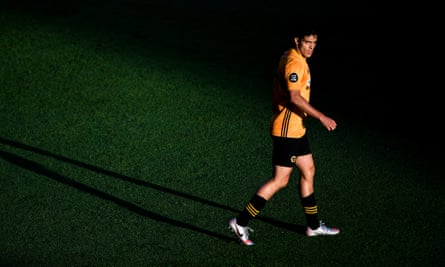
Ben Fisher: Mané. Jürgen Klopp’s first major signing has played an influential role at the club, especially in the past couple of trophy-winning seasons. The exhilarating forward’s acceleration, agility and knack for popping up in the right place have created a wicked cocktail for defences. Jamie Vardy, Ings and Jiménez have equally been immense.
Barry Glendenning: Alexander-Arnold’s reinvention of the full-back role and ongoing evolution as a consistently excellent performer despite his tender years remain a joy to behold.
Andy Hunter: Mané. Henderson is a worthy recipient of the FWA footballer of the year award for leading by example on and off the pitch but, by the simple definition of ‘best player’, it is Mané for me. Exhilarating and decisive throughout Liverpool’s title-winning campaign.
David Hytner: It has to be a Liverpool player because of what they have achieved so I’ll go for Mané, who has made the difference many times and been so thrilling to watch.
Jamie Jackson: De Bruyne. Bruno Fernandes (in half a season) comes close but the Belgian has been a tour de force of midfield play all term.
Jonathan Liew: Van Dijk. The key player in the best team. Liverpool’s entire system depends on pouring bodies forward, secure in the knowledge if they get countered Van Dijk will bail them out. Without his presence, aerial dominance, one-on-one ability and playmaking, none of the other stuff works.
Paul MacInnes: Marcus Rashford. Substantially increased his goal tally despite moving out wide, recovered from serious injury to become a crucial part of Manchester United’s late resurgence and provided that wow factor on the pitch. But in a year like no other Rashford stands out for what he did off the field, making the feeding of children from poorer families a national priority, even among the government. Footballers aren’t role models by default, but this is what it looks like when a player becomes one.
Scott Murray: Mané, whose sharp, disruptive brilliance makes chaos out of order and gives Liverpool an extra lock-picking dimension. He also chips in with an absurd number of important goals.
Sachin Nakrani: Henderson. Stitched everything together for the champions with his leadership, desire, energy and, yes, ability. The cool kids may not want to hear it but Henderson is an excellent midfielder, quite old-fashioned in how he can do a little bit of everything, which this season even included setting up a fund for the NHS.
Jacob Steinberg: Alexander-Arnold’s hopes of redefining the right-back role did not seem so ridiculous after he contributed his 13th assist of a wonderful campaign during Liverpool’s 5-3 win over Chelsea last week, breaking the record he set for defenders last season. The 21-year-old is clearly far more than a very good defender. He is a generational talent, blessed with a right foot that evokes memories of David Beckham’s. Those crosses and free-kicks are potent.
Louise Taylor: John Egan. I’m using a wider definition of best than some. The Sheffield United player is no De Bruyne but he has been consistently excellent as the holding defender flanked by two overlapping centre-halves in Chris Wilder’s back-three. The Irishman was, foolishly, shown the door by Sunderland after suffering a leg break on loan at Bradford which necessitated complex surgery, and he ended up at Gillingham. Hats off to their manager at time, Peter Taylor, who nurtured Egan’s talent before moves to Brentford and then Sheffield United.
Jonathan Wilson: Henderson. Nobody so embodies Liverpool’s work ethic, organisation and capacity to press through midfield – and look at how performances have tailed off in his absence. He may lack the technical flair of many of his teammates but Henderson is both brain and heart of Klopp’s Liverpool.
Winners and losers as Premier League's 352-day season ends
Best manager
EA: Jürgen Klopp. There is a reason everything runs like clockwork almost every time Liverpool play and it is because every player knows exactly what he is meant to be doing. Recovering from the disappointment of missing out to City last season and guiding Liverpool to the title 30 years on from their previous one ranks as one of the greatest managerial achievements of the modern era.
NA: If Leicester had held on to a top-four spot it might have been Brendan Rodgers, who should still take plenty of credit. In the event, the scale of Klopp’s achievement goes without saying and there are other candidates just behind him. Very honourable mentions to Chris Wilder, Nuno Espírito Santo, Sean Dyche, Graham Potter, Ralph Hasenhüttl and, for the way Aston Villa clawed it back, Dean Smith.
SB: Wilder is the romantic choice given his achievements at Sheffield United, but Klopp can’t be passed over just because he is a bit obvious. It has been another remarkably impressive season for the team and for him individually.
PD: Smith. Villa were the last team to confirm their participation in the Premier League and had to draft in a dozen new and raw players after winning the Championship play-off. Then they lost the spine of their team to injury. Smith used lockdown to tighten up the way they played and secure survival. Top management.
BF: Wilder. A top-half finish with a modest squad is an extraordinary achievement for Sheffield United, who have given Arsenal, Chelsea and Tottenham bloody noses along the way. Dyche continues to work wonders with a small squad at Burnley and Nuno has superbly led a Wolves team whose season started 12 months ago.
BG: A toss-up between Klopp and Wilder, whose respective achievements at Liverpool and Sheffield United were stunning. Klopp, but only by a whisker.
AH: Klopp showed more shrewd judgment last summer when investing faith in his Champions League-winning squad rather than money on signings. Produced a truly outstanding Premier League champion and, what’s more, deflected the pressure of a 30-year wait throughout their demolition job.
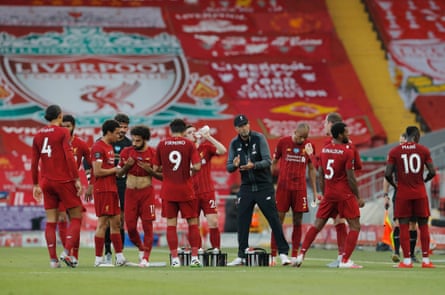
DH: Klopp. No explanation necessary.
JJ: Wilder. In a first year back in the big league Sheffield United finished ninth. An admirable feat.
JL: Wilder. In terms of maximising resources, finding a style that works, building a cohesive unit and not just surviving but also thriving in one of the world’s toughest leagues.
PM: Wilder. Sheffield United are enjoying their greatest success in a generation and Wilder is the man responsible, so that is reason enough. But his tactical acuity, ability to react in matches, to continually get the maximum from his players and rotate his squad judiciously have been on display week in, week out, even after the restart. Plus, he’s a proper character, which should always be encouraged.
SM: Klopp turned doubters into believers, though Hasenhüttl did that too, an entertaining Southampton team with a clear identity emerging from the ruins of that nine-goal debacle. Hats off to his board for staying patient; compare and contrast with their carry-on counterparts at Watford.
SN: Klopp. I was tempted to go for Wilder but ultimately it’s impossible to look past the man who not only ended Liverpool’s long wait for a league title but also made them champions of the world. He did it through force of personality, incredible man-management and something that is often overlooked – tactical nous. A brilliant, all-round manager and without doubt one of the best in Liverpool’s history. Which is saying something.
JS: Wilder did a remarkable job but it cannot be anyone other than Klopp, who deserves immense credit for ensuring Liverpool were able to produce another huge effort after missing out on the title to Manchester City last season. Liverpool’s success was a victory for astute coaching.
LT: Wilder. Comparisons are not so much invidious as impossible given the often vastly differing budgets and contexts but Wilder’s rise from League One to almost qualifying for Europe while introducing overlapping centre-halves and creating an incredible squad camaraderie takes some beating. But then so does Klopp’s achievement in choreographing Liverpool’s jaw-dropping lead over Manchester City. Honourable mentions, too, to Dyche and Newcastle’s Steve Bruce, the latter for confounding a host of doubters including this reporter.
JW: Wilder. Klopp has clearly done a remarkable job and the early signs are promising for Mikel Arteta, but Wilder has given hope to all lower-league sides. Innovative tactics and smart man-management can still make a difference in a world dominated by budgets.
Best goal
EA: Crystal Palace fans are justifiably aggrieved that it didn’t even make Match of the Day’s shortlist because Jordan Ayew conjured up a magical goal that ranks among the best I have seen live to brighten up a dreary Boxing Day game against West Ham at Selhurst Park.
NA: Ayew’s pirouetting solo effort, finished off with a deft chip, against West Ham gets my vote for reasons expanded upon elsewhere. Immaculately planned team goals have their place but nothing beats genius like this.
SB: Tammy Abraham (Watford v Chelsea). Assist of the season, really, though the finish was not too shabby. Jorginho’s pass from the halfway line, though, was of supernatural brilliance.
PD: Jamie Vardy v Arsenal. This simple finish and the devastating sequence of one-touch passes that made it possible stand as testament to how beautiful Leicester can be when at their best
BF: Perhaps not the most obvious choice but Matej Vydra’s goal for Burnley at Southampton in February was a peach. He eliminated one defender, Jack Stephens, by taking a wonderful flighted ball by Jeff Hendrick on his chest before nudging the ball away from another, Kyle Walker-Peters, and lashing a left-foot effort into the top corner. Better still, it was his first goal for 511 days.
BG: Son Heung-min’s slaloming 70-yard solo effort for Tottenham against Burnley – as the old band name sort of goes: And You Will Know Him By The Trail Of Defenders.
AH: Mohamed Salah v Manchester City. A brilliantly executed, difficult team goal made to look simple by the quality of those involved. Sums up this Liverpool team in a way. Trent Alexander-Arnold switches play from right to left with a superb cross-field ball, and with his ‘weaker’ left foot, Andy Robertson controls before delivering a typically inviting cross that Salah heads beyond Claudio Bravo after the ball bounces up at him at pace. Four touches that took Liverpool from their own half to the City net and underlined their superiority over their closest challengers.
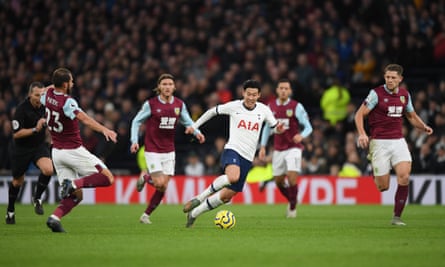
DH: Ayew v West Ham. I’m not sure this received the coverage and adulation it deserved. First, the 360-spin away from one defender, then the dart between two more and finally the gloriously composed dinked finish to win the game in the last minute. I remember thinking it would win goal of the season; thanks to Son v Burnley, it didn’t even win goal of the month.
JJ: Bruno Fernandes. ‘Harry Maguire-Nemanja Matic-Mason Greenwood-Fernandes-Goal’ went a sweeping move from the Manchester United area to Brighton’s.
JL: In a disappointing season for great goals, Son against Burnley. The only one of the main contenders to combine technical excellence, physical excellence and positional intelligence.
PM: Son against Burnley. It was like a scene from a Fellini movie, Tottenham’s No 7 pursued by an ever increasing phalanx of Burnley players as he runs the length of the pitch to score. Usually I require a dribbled goal to include a complicated piece of skill to beat a man, but not on this occasion. Son’s goal is pure acceleration, but he does it again, and again, through a team that would happily have brought him down if they could.
SM: Alireza Jahanbakhsh’s bicycle kick, steered in for Brighton against Chelsea on New Year’s Day. An intricately engineered finish, the sort that’s gone a bit out of fashion, with blooters and curlers all the rage right now. Don’t let the fact that Kepa Arrizabalaga was rooted to the spot, as per usual, take anything away from it.
SN: Son v Burnley. I was fortunate enough to be there in December when Son went on a run that started just outside Spurs’ area and saw him surge past seven players before putting the ball into the back of the net with a finish that was as composed as the buildup had been thrilling.
JS: Son showed dazzling quick feet, skill and pace when he scored a brilliant solo goal against Burnley. He started deep in his own half and had the ball seemingly glued to his feet as he went past half the Burnley defence before finishing confidently.
LT: Matty Longstaff v Manchester United. It was early October when Newcastle beat Manchester United 1-0 at St James’ Park courtesy of a fabulous goal from the debut-making 19-year-old central midfielder from nearby North Shields. Struck low, imperiously and unerringly from 25 yards, Longstaff’s winner was stunning in all sorts of senses. An afternoon to remind everyone that sometimes, just sometimes, dreams really do come true.
JW: Longstaff v Manchester United. Goals aren’t just about the technical quality or about the aesthetic but also about the occasion. It wasn’t just that it was Longstaff’s debut or that it was the winner against Manchester United (the first scored by a Steve Bruce side), it was the buildup as Jethro Willems, having jinked into the left side of the box, rolled the ball back into space for the midfielder. On a sodden afternoon, there was one of those moments of delicious anticipation as everybody could see that a hard low shot would fly in, if only he could keep it down. He did.
Best match
EA: Other than Southampton’s revenge mission victory over Leicester a few months after being walloped 9-0 at home it’s quite hard to recall anything from the pre-lockdown world. So I’ll go for Chelsea’s victory over Manchester City at the end of June that meant Liverpool were crowned champions. End-to-end stuff on a dramatic night.
NA: Strictly chosen from those I covered live, plenty of see-sawing affairs played havoc with deadlines at the Emirates. But they were bettered by one further east, at the London Stadium, where West Ham and Brighton fought an error-strewn 3-3 draw that, if lacking in quality, offered full-throttle entertainment for the entire 90 minutes.
PD: Aston Villa 0-0 Sheffield United. In much the same way as rain feels glorious on your first day out of the nick, the return of football after a three-month pox-enforced shutdown felt sweet. And VAR didn’t even muck it up. Oh wait, it did.
BF: Southampton 0-9 Leicester. An ‘I was there’ moment. Horizontal rain, a red card, two hat-tricks and an exhibition in cold finishing.
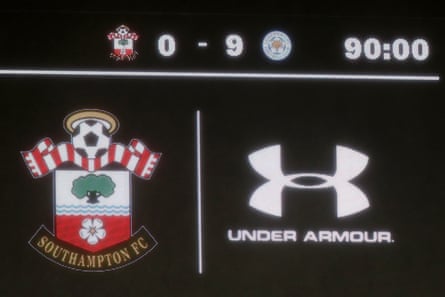
BG: It wasn’t the most competitive of affairs, but Southampton 0-9 Leicester played in sideways rain on a miserable Friday night at St Mary’s was enjoyably bonkers.
AH: Everton 3-1 Chelsea, 7 December 2019. Everton were in the relegation zone following a 5-2 drubbing at Anfield that signalled the end for Marco Silva and the appointment of a highly emotional Duncan Ferguson for his first game in temporary charge. It could have gone either way against a team of Chelsea’s quality but, with the home side impassioned and Ferguson throwing ballboys in the air, Goodison Park was treated to an all-too-rare demonstration of what could happen if Everton ever assemble a team their fans can identify with.
DH: Chelsea 2-1 Man City. A contest of quality and intensity that transcended the absence of fans and had a pretty major consequence elsewhere.
JJ: Manchester United 1-3 Manchester City, Carabao Cup semi-final. This might have been 7-0 to City by the interval (it was 3-0) before, football being a funny game, United somehow reasserted themselves.
PM: Norwich 3–2 Manchester City. In such an otherwise forgettable season, typical that Norwich should pull off the shock of the year. Late summer, early evening, the sun shone on Carrow Road as Daniel Farke’s side played their way through the back-to-back champions. Some of their football was gorgeous and they were brave off the ball and on it. City were insipid, their performance a harbinger of disappointment to come.
SM: A toss-up between Norwich City 3-2 Manchester City and Watford 3-0 Liverpool, both occasions on which the natural order was given an entertainingly good rattle.
SN: Liverpool 5-3 Chelsea. Lots of goals, lots of great attacking play, swings in momentum, an amusing touchline ruck and the strangest trophy presentation in English football history. The only thing missing from this game was supporters.
JS: Wolves 3-2 Manchester City had it all: VAR controversy, a defiant Raheem Sterling putting 10-man City 2-0 up and Adama Traoré using his outrageous talent to inspire a stunning comeback from Wolves, who showed just how good they are by doing the double over City.
LT: Sheffield United 3-3 Manchester United. Back in that now seemingly far distant old world of late November, the Premier League’s enduring, and enrapturing, dramatic power was encapsulated on a Sunday afternoon in south Yorkshire as Sheffield United cantered into a two-goal lead. Manchester United rallied ferociously with Marcus Rashford putting them 3-2 in front before Oli McBurnie 90th-minute volleyed equaliser very nearly lifted off Bramall Lane’s roof.
JW: West Ham 3-2 Chelsea. Amid some deeply unmemorable games after the restart, the game that effectively secured West Ham’s Premier League future stands out. Chelsea had levelled at 2-2 and as West Ham got deeper and deeper an away winner seemed inevitable, but instead, in the final minute, a perfect break was ended with a glorious finish from Andriy Yarmolenko.
Best signing
EA: It’s all about Bruno Fernandes. The Portugal midfielder has finally provided the spark that has been missing at Old Trafford for so long. An honourable mention for Allan Saint-Maximin as well.
NA: You could barely move in January for seeing Fernandes’s name and it was hard not to wonder, when he finally arrived at Old Trafford for £68m, whether he would be worthy of the hype. Big mistake. Fernandes is patently the kind of winning, inspirational force of nature United have missed and he has energised others while settling games himself. Without him, they would have been bobbing along outside the top four.
SB: Everyone will say Fernandes, but only because Fernandes is obviously the right answer. Honourable mentions for Danny Ings, who made his switch to Southampton permanent last summer, and Tomas Soucek, who has made a huge contribution since his arrival at West Ham in January.
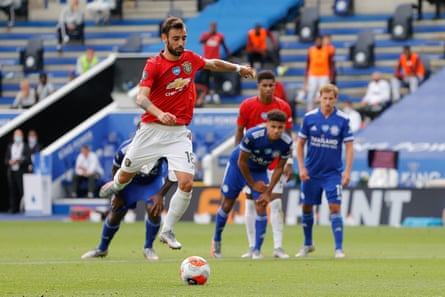
PD: Saint-Maximin. If you don’t cheer when watching this guy, you don’t know how to live. Or you’re a defender trying to figure out how to subdue him.
BF: Can we count Ings? A £20m buy for Southampton last summer after spending the previous season on loan there, Ings returned in style, scoring 22 goals – only Vardy scored more – to spearhead the attack with a much-needed swagger. He is lethal in front of goal but his infectious work ethic has proved useful in both boxes. For pure excitement, Saint-Maximin, while Gary Cahill, a free transfer, has been a revelation.
BG: Having failed in their efforts to sign Fernandes last summer, Manchester United finally brought him to Old Trafford in January. His immediate impact has been little short of sensational.
AH: Fernandes. Not exactly cheap or under the radar but a class act who raised the games of those around him and elevated United from mediocrity into Champions League qualifiers.
DH: Fernandes. From the moment he arrived, United have been transformed. Great numbers, great mentality. Can I also give honourable mentions to Gabriel Martinelli and Saint-Maximin?
JJ: Fernandes. What a footballer, what a catalyst. The best post-Alex Ferguson acquisition.
JL: Fernandes. Transformed not just Manchester United’s anaemic midfield, but the whole feel of the club. Arrived shortly after the season’s nadir, a 2-0 defeat to Burnley, and gave them a purpose and a blueprint.
PM: Ings. He drove Southampton’s escape from the drop. A push for the golden boot ultimately fell short but Ings scored all types of goals in all types of matches under all kinds of pressure. It’s likely Saints would have been sunk without him.
SM: Fernandes, who follows Billy Meredith, Denis Law and Eric Cantona in transforming Manchester United in a flash. He single-handedly saved Ole Gunnar Solskjær’s job, though whether that’s a good or bad thing for United in the long run is a debate for another day.
SN: Fernandes. Not cheap but transformative signings rarely are and that is what Fernandes has been for United. The midfielder has injected creativity and character into the team and with better players around him next season, namely in defence, could be the spearhead for a full-on United revival.
JS: Fernandes has given United hope.
LT: Saint-Maximin. Newcastle have not always been too easy on the eye this season – with one notable exception. The wonderfully skilful Saint-Maximin has brought a touch of Côte d’Azur sunshine to Tyneside, invariably proving gloriously entertaining with his chicane dribbles a consistent highlight. The excitement is only exacerbated by the winger’s sheer unpredictability. An unorthodox talent turned poster boy for the advantages of not coaching young boys too early, he played street football before joining the formal academy system later than most.
JW: Fernandes. An obvious answer, but it’s hard to remember any other signing who has so transformed a side.
Worst flop
EA: João Cancelo was signed to give Manchester City more depth at full-back but has failed to live up to his £60m price tag. All the training in the park didn’t do Tanguy Ndombele much good either.
NA: Alex Iwobi has never quite shown top-bracket potential so it was some feat for Arsenal to persuade Everton to part with £35m for the winger last August. One league goal later, the deal seems even more staggering. For their part Arsenal can be charged with “biggest over-the-odds payment” in spending £72m on Nicolas Pépé, although the Ivorian has recently showed signs of settling in and at least provided some spectacular flourishes.
SB: It’s hard to judge between Ndombele’s £55m disappearing act at Tottenham and Arsenal’s entire league season, but either way this prize is heading to north London.
PD: Pep Guardiola. You don’t have to be Danny Drinkwater to know Premier League winners should have done much better. Manchester City lost their title in record time because they were defensively and mentally weak.
BF: The £34m Everton splashed out on Iwobi looked steep at the time but, almost a year on, it looks an extremely poor piece of business. Arsenal must have been pinching themselves.
BG: VAR. It was brought in to eliminate, or at least minimise, contentious decisions and has succeeded only in creating more. Time to put it back in its box and hide it under the bed.
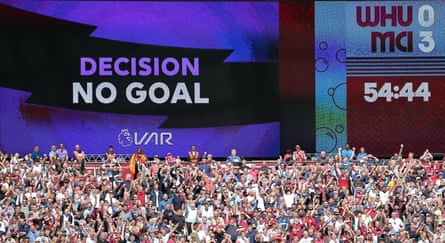
AH: VAR. An unmitigated disaster that has stripped authority from referees and the pure joy of celebrating a goal from those who pay good money to be inside a stadium.
DH: I’m sorry to say that David Luiz has come to seem like a liability when he is one-on-one with attacking players. He doesn’t just make mistakes, he has catastrophes.
JJ: City’s title defence. Claiming three in a row is a mammoth ask. But going from champions to an 18-point deficit is odd.
JL: Arnaut Danjuma. There were more expensive flops, more spectacular flops, more inept flops. But as Bournemouth drop out of the league, somehow the £14m Dutch winger is emblematic of a club and a transfer strategy that badly lost its way. Only six starts, no goals and no assists in a miserable injury-plagued campaign.
PM: Ndombele. No doubt a technically proficient player with an eye for goal, his progress was hampered by a change of management. But Ndombele has failed to grasp the nettle of playing in the Premier League under José Mourinho and Mauricio Pochettino and that’s not something that can be entirely blamed on others. A £55m club-record fee currently looks far from being justified.
SM: Brendan Rodgers. Finishing fifth with Leicester hardly counts as failure, except in the context of all that preening over release clauses amid vague interest from Arsenal. After securing a five-year big-bucks extension, his team were immediately schooled by Manchester City and Liverpool, triggering a dismal decline in confidence and form. If Leicester fail to start 2020-21 on the front foot, Leicester could be double-checking the fine print on that contract fairly quickly.
SN: VAR. There have been the clangers resulting from incompetence and officials being scared to overrule their mates and there have been the calls that have been technically correct but undeniably awful in how they have changed the flow and feeling of games. I was open to the introduction of VAR but, like many, would bin it after this most miserable of debut seasons.
JS: Roberto gave West Ham’s opponents hope. One of the worst goalkeepers to play in the Premier League. What on earth was Manuel Pellegrini thinking when he signed him? The deal cost him his job.
LT: Joelinton. It seems a bit cruel to single out Newcastle’s Brazilian, particularly as he seems nice, clearly tries his utmost and evidently cares. He’s also being played out of position at centre-forward – he shone in a left-sided attacking role at Hoffenheim. But, and it’s a big but, two Premier League goals when you cost £40m is simply not good enough.
JW: David de Gea. Yo hope there’s still a great goalkeeper in there but De Gea’s decline over the past two years has been profound. The howlers have become more common and he’s stopped making the saves he used to. And all on £350,000 a week.
Biggest gripe
EA: VAR and referees with personalised boots. But seriously: more common sense is needed next season please – Sheffield United’s goal against Aston Villa could easily have been given once the mistake over the ball crossing the line had been identified.
NA: Why was VAR railroaded upon us when officials were clearly not up to speed on its use? It has facilitated some important decisions but overall its impact on the division has been toxic. When it is combined with an absurd handball law, one would be forgiven for fearing outcomes are being dictated by people who actively dislike the sport. If the process can be improved – VAR worked seamlessly at the World Cup until the final, for example – then fantastic. But why inflict havoc on the world’s most popular league in the meantime?
SB: VARs taking 20 minutes to disallow goals because someone had an offside earlobe.
PD: One of Frank Lampard’s probably.

BF: The ingrained relationship between gambling and football. Half of the league’s teams wore shirts sponsored by betting firms.
BG: The woeful shortcomings of the handball law are a source of constant frustration and irritation.
AH: Footballers being singled out over pay cuts by the health secretary Matt Hancock while some of them took on what should be the government’s responsibility of funding the NHS and ensuring kids receive free school meals.
DH: I cannot stand it when goals are ruled out after lengthy VAR reviews for hairline offside decisions the naked eye cannot see.
JJ: Griping. It is football, it is a glorious pageant. Unadulterated entertainment. Enjoy.
JL: When people feel sufficiently secure in their racism to blazon it from a plane, as Burnley fans did in June, we can safely say that football’s culture has been too permissive of deplorable views. For all the laudable gestures football has made in recent months, there are not enough signs that the game’s authorities – governing bodies, clubs, platforms and the traditional media – are prepared to do the real hard work. That means educating fans, diversifying their own organisations and more actively policing the toxic tribal discourse masquerading as “debate”.
PM: That global pandemic which nearly crippled the sport then forced it to return without spectators as a new and sanitised phenomenon. Certainly puts VAR into perspective.
SN: Football’s return in June brought with it a host of innovations, among them the allowance of five substitutes. The reasoning behind it was sound but the effect was what many feared – an advantage for the bigger, richer clubs. So that should be the end of it, but, alas, no because the Premier League has been given permission to continue with it next season. It is a grim prospect and the hope must be that top-flight clubs say thanks but no thanks.
SM: Checking ... checking ... [completely unnecessary 120-second pause] ... ah yes, it’s VAR, which has completely banjaxed the natural rhythms of the game for no visible benefit. Pop it back in the box, will you? It’s fine to admit a mistake, we know you meant well.
JS: The law stating any goal featuring the use of an arm must be disallowed is infuriating. Nobody wants to see players punching the ball into the net but surely a middle ground can be found, especially now VAR is picking up the most minimal of accidental handballs. How is it fair to give a free-kick against a player who only handled the ball after being fouled by a defender first? Or against a player who has the ball kicked at his hand by an opponent?
LT: That Newcastle’s interminable Saudi takeover saga has been running for more than four months. The time for Richard Masters, the Premier League chief executive, to make a decision is long overdue. Masters is being desperately unfair on Newcastle, their fans and everyone connected with the club; if he wants to be a proper leader he needs to have the nerve to make contentious calls within acceptable timeframes. Meanwhile, Newcastle are left in paralysing limbo.
JW: People talking about VAR and referencing “umpire’s call”, as though the use of technology in cricket and football were directly comparable. Although the wider point about a margin of error with the technology and the difficulty of what happens between frames is valid, umpire’s call works in cricket because it’s a sport of a series of discrete actions; decisions can be corrected once the ball is dead. In football, an incorrect offside call stops an attack which cannot then be restarted. It is not the same as a batsman being given out or not out.
